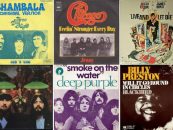
Metal bands are not generally known for tackling other artists’ material. Still, on occasion, the likes of an Iron Maiden, Metallica or Judas Priest offer up a newfangled take on a classic rock gem. Sometimes that interpretation is a straight-up tribute; other times, a familiar song is turned upside down and given a slash-and-burn treatment that was previously unimaginable.
The examples we’ve pulled together below represent both sides of that spectrum. In lieu of trying to assemble a “greatest metal-band covers” list, we decided to spotlight some of the more interesting and unexpected interpretations. We’ve also limited our choices to metal groups that are well-known to most fans of contemporary music.
“Diamonds & Rust”—Judas Priest (original by Joan Baez)
Few songs have gotten a more radical makeover than Joan Baez’s “Diamonds & Rust” received at the hands of Judas Priest. Covering the song for their third album, 1977’s Sin After Sin, the British metal rockers transformed Baez’s tender acoustic ballad into a full-on propulsive heavy metal behemoth. Frontman Rob Halford delivers the lyrics with swagger and bravado, while guitarists Glenn Tipton and K.K. Downing fuel the ferocity with knife-edged six-string runs. Years later, in an interview with the QMI Agency, Baez said she “loved” Priest’s version. “I was so stunned when I first heard it,” she said. “I thought it was wonderful.”
“Dust in the Wind”—Scorpions (original by Kansas)
German metal pioneers Scorpions put aside their hard-rock guise in early 2001 for a series of “unplugged” shows staged in Lisbon, Portugal. Among the three non-original songs the band performed was an affectionate rendition of this perennial Kansas favorite. In a more conventional setting, guitarist Rudolf Schenker would likely have offered up a dazzling six-string solo in the bridge, but here, the middle section is highlighted by a lovely cello interlude that adheres closely to the Kansas original. Highlights from the shows were pulled together for Scorpions’ Acoustica album, released later that same year.
“Turn the Page”—Metallica (original by Bob Seger)
It’s hardly surprising that Metallica would bring a heavier, more portentous vibe to one of rock’s great road songs. What’s more interesting is how, in an accompanying video, the band dispensed with the road motif in favor of presenting the backstory of a single mother (portrayed by adult film star Ginger Lynn) supporting herself and her daughter through work in the sex industry. Released as the first single from their 1998 covers album, Garage Inc., Metallica’s version topped the Billboard Hot Mainstream Rock Tracks chart for a whopping 11 consecutive weeks.
Related: When Metallica met Lou Reed
“Leader of the Pack”—Twisted Sister (original by the Shangri-Las)
The Shangri-Las could scarcely have imagined, back in 1964, that their girl-group classic “Leader of the Pack” would one day be covered by the likes of Twisted Sister. Though sung from the perspective of the biker, the glam-metal band’s version was mostly faithful, stylistically, to the original recording—although, of course, the accompanying video was rife with the group’s slapstick humor. Released as the first single from the 1985 album, Come Out and Play, the Twisted Sister cover reached #53 on the Billboard Hot 100 chart, and topped out at #34 on the U.K. singles chart.
“Dream On”—Ronnie James Dio & Yngwie Malmsteen (original by Aerosmith)
Yngwie Malmsteen and the late Ronnie James Dio—accompanied by bassist Stu Hamm, drummer Gregg Bissonette and keyboardist Paul Taylor—recorded this stately version of Aerosmith’s ’70s classic in 1999, for an Aerosmith tribute album. As one would expect, Malmsteen unleashes his share of shredded arpeggios, but more notable is the tasteful restraint the guitarist employs, the better to emphasize Dio’s emotive interpretation. Ratcheting the melodrama up a notch, Dio nonetheless retains the spirit of Steven Tyler’s impassioned delivery, making this performance a real tribute, and much more than a mere pastiche.
“Cross-Eyed Mary”—Iron Maiden (original by Jethro Tull)
A longtime favorite among Jethro Tull fans, “Cross-Eyed Mary” was written in essence as a companion piece for the title track of the band’s classic 1971 album, Aqualung. Twelve years later, heavy metal’s Iron Maiden issued a fiery cover as the B-side of their 1983 single, “The Trooper.” Iron Maiden ratchets up the tempo, as vocalist Bruce Dickinson dispenses with Ian Anderson’s mid-range vocal in favor of an upper-register, operatic wail. Not surprisingly, Iron Maiden opted not to include a flute in their scorching rendition.
“Since I Don’t Have You”—Guns N’ Roses (original by the Skyliners)
Artists as varied as Don McLean, Ronnie Milsap, Ricky Nelson and Patti LaBelle—among many others—have recorded their own takes of this 1958 classic. Without a doubt, however, the most unlikely version was the one made by Guns N’ Roses for their 1993 covers album, The Spaghetti Incident? Released as a single that same year, GNR’s version topped out at #69 on the U.S. Hot 100 chart, but in the U.K. it became a top 10 hit. Of course, Guns N’ Roses have also covered “Knockin’ on Heaven’s Door,” “Live and Let Die” and a handful of other classics, but we like that this Skyliners tune lies a bit more off the beaten path.
“No More Mr. Nice Guy”—Megadeth (original by Alice Cooper)
In their original arrangement, Alice Cooper (the band) emphasized the pop aspect of “No More Mr. Nice Guy,” crafting a radio-friendly hit that reached #25 on the U.S. singles chart. Sixteen years later, thrash-metal band Megadeth came up with a slightly more sinister version for the Wes Craven-directed comedy slasher film, Shocker. The single, which scored moderate success in the U.K., was in many ways a fitting tribute to Cooper, who provided paternal guidance for Megadeth’s Dave Mustaine when the latter was getting his career underway. Incidentally, for those who want to dig deeper, Megadeth also recorded an incendiary version of Nancy Sinatra’s “These Boots are Made for Walkin’.”
“La Grange”—Van Halen (original by ZZ Top)
Van Halen performed a trove of classic-rock songs back in their club days, but their affection for ZZ Top material was especially evident. Bootlegs abound of the group tearing through renditions of “Tush,” “Waiting for the Bus,” “Beer Drinkers & Hell Raisers” and other ZZ Top favorites. This performance of “La Grange”—Billy Gibbons and company’s breakthrough 1973 single—finds Eddie Van Halen duplicating Gibbons’ pinch harmonics while mixing in some rapid-fire arpeggios. Other Van Halen covers—“Dancing in the Street,” “Oh, Pretty Woman” and “Where Have All the Good Times Gone,” for instance—might be better known, but this early ZZ Top cover is one of those rare performances that showcases the band’s love of down-and-dirty blues rock.
“Heroes”— Motörhead (original by David Bowie)
Motörhead was no stranger to cover songs—their very first single was a revved-up version of the Eddie Holland soul classic, “Leaving Here”—but, in retrospect, the metal trio’s stirring rendition of David Bowie’s most famous anthem seems especially poignant. Recorded in 2015, just months before the passing of frontman Lemmy Kilmister, the track was released two years later as a last-minute addition to the covers collection, Under Cover. The group played the song live only once, delivering a soaring performance as an encore during their appearance at Germany’s Aftershock Festival. “It’s such a great song,” Motörhead guitarist Phil Campbell later said. “Lemmy ended up loving our version.”
- Singing Rock Drummers: From the Skins to the Mike - 03/02/2025
- Rod Stewart & Friends: 10 Great Collaborations - 01/10/2025
- Band on the Run: The LP That ‘Saved’ McCartney - 12/05/2024






3 Comments so far
Jump into a conversationThe one that immediately came to my mind, which wasn’t mentioned here, was Nazareth’s cover of Joni MItchell’s “This Flight Tonight.”
Of course, the prototype for all this would be Vanilla Fudge’s “You Keep Me Hangin’ On”…
Some songs become timeless classics, and it’s crucial for artists to release them in physical formats and offer merchandise. It keeps the magic alive, allowing fans to hold a piece of their favorite music and support the artists they love. Long live the music and its tangible connection!
That Maiden cover was crap. They’ve done so many. Their best was Thin Lizzy’s “Massacre” followed by “Reach Out” by FM.